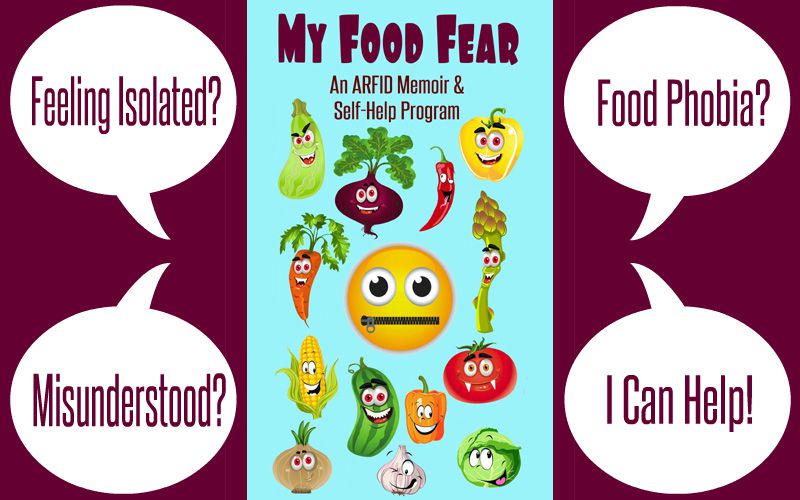Your child will not eat. What do you do? Should you ignore it? Should you force them? Will a mistake in how you handle this situation cause your child to have a life-long eating disorder?
Being a parent is the toughest job in the world. While most people can biologically have children, so many people are really terrible parents! When a parent tries to do everything right, their intentions might be great, but this does not always guarantee awesome results. Remember that many experts feel that most cases of ARFID can be avoided in early childhood and the blame for creating some cases goes directly on the person’s parents…
I was that child who would not eat. I remember being a terribly finicky eater at the age of 2 and I probably was difficult to feed even before the age of my first memories… While many children grow out of their finicky eating habits, I did not. In fact, I got worse with time until I barely ate anything at all. This selective eating disorder ruled so many aspects of my life until the age of 37…
Is your worry about how to deal with a child who won’t eat justified? Certainly!
Child Will Not Eat Normally or At All
Parents often ask me how much their children should be eating. They are not sure of the quantity or diversity that is considered normal. I usually ask them if everything seems to be ok and if they say yes, then their child is most likely fine. This is because most parents worry so much about their children and can recognize a real problem when they see it.
If a child simply will not eat much, meal after meal and day after day, they need to see a doctor to be sure they are ok physically. This is important. Kids need to eat in order to grow and stay healthy. Kids DO NOT need to overeat and become obese, like SO MANY children in the world today. In fact, this is classic child-abuse when parents encourage such behavior.
If a child will not eat most foods, but otherwise eats sufficient quantity, then the child might have or be in the process of developing ARFID, also known as avoidant restrictive food intake disorder. This is usually no emergency, but might be worth bringing to the attention of the child’s physician or a qualified mental healthcare provider. I do caution parents to be wary of using any type of pharmacological products to treat selective eating disorder. Many psychiatrists prefer psychoactive drugs in these cases and these drugs are both dangerous and unpredictable in their effects. There is NO NEED to use drugs to treat ARFID. In fact, treatment might not even be needed at all.
What Should I Do to Help?
Many doctors will say to leave a healthy child alone, even if they seem to eat very few foods. As long as they are ok, trying to force them to eat might do more harm than good. Many, many children have a natural fear of new foods, called food neophobia. Most children will grow out of this fear as they mature. Children who obviously do not eat quality foods in sufficient quality should be monitored to ensure they are getting all of their nutritional requirements. This might become an ongoing concern for parents and care providers alike.
Some parents take the path of forcing children to eat. You can not leave the table until your plate is clean. You will be punished if you do not eat, etc. This might work in select cases, but rarely does, especially anymore. More often than not, parents who take a hardline stance will eventually have a run-in with police, child protective services or a social worker. Do you really need this type of drama in your home? Understanding and compassion, along with proactive cognitive and behavioral modification techniques seem to work far better than forcing a child to do something that they obviously can not and will not do without major discomfort to mind and body.
There is often a fine line between doing too little and doing too much. Try to find balance that will ensure your child’s health and development without causing them to hate you, report you to the authorities or simply go even further into their selective eating habit isolation.

My Child Will Not Eat. This Was Me.
I would not eat from as far back as I can recall. By the age of 2, I already had well established rules on my own eating. I loved some foods and hated others. I feared many foods I knew nothing about. The reasoning was absent and/or arbitrary.
At age 4, I realized that some of my favorite foods were made from animals. I never knew that animals had to be killed in order to make hotdogs and bologna, for example. Once I discovered this, I made a pledge to NEVER eat them again. I became a strict vegetarian at age 4, despite no one else in my family demonstrating such behavior.
I continued to eat fewer and fewer foods as a teen and an adult until I basically ate a handful of food items each and every day. I consumed the same exact breakfast, lunch and dinner without much variation for decades… This lasted until my late 30s. Then, miraculously, I overcame my long-standing eating disorder and it became possible (and even incredibly pleasurable!) for me to eat basically normally. I am still a vegetarian, since this choice was made consciously. However, I now eat almost every other types of food except meat, including some very exotic fare!
If you are interested in how my mother handled me as a child, I describe the entire process in my book My Food Fear. Bless her soul, she did most things right and I grew up healthy and strong, despite the odds being stacked against me. Since I have worked in the chronic pain and mindbody sectors of healthcare my entire life as an author, educator and patient-rights advocate, I now have some very interesting views on dealing with eating disorders like ARFID. I detail all this in my book as well. I am sure that you will enjoy it!

